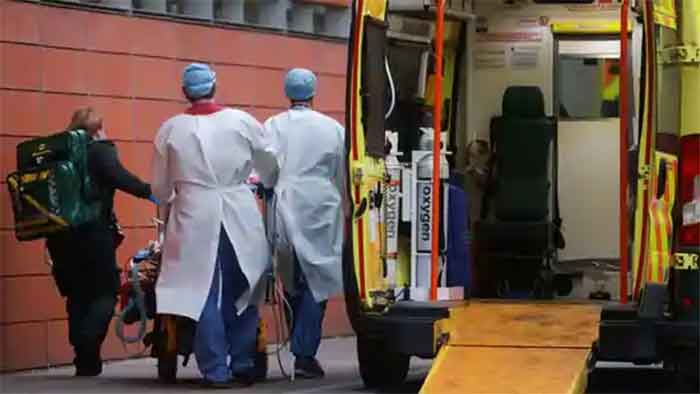
Not exactly Thermopylae. Not even close. The hundred thousand who have now been taken by COVID-19 in Britain were not determined warriors holding up the forces of a mighty empire to save their land. They were the innocent victims of infection, mismanagement and miscalculation. Central to the policy which led to such losses was a practised bumbling which has become the ne plus ultra of Prime Minister Boris Johnson and his Conservative government.
In recording 100,000 deaths from COVID-19, Britain became the fifth country, and of those the smallest, to pass six figures. Over half of the numbers were recorded since November, with the virus strafing through the population after the relatively lower levels of infection over the summer. To add to the woes of the country, a new strain of the novel coronavirus was detected in the country, suggesting that it was up to 70% more transmissible.
On January 22, Johnson did little to reassure the population. Not only was the new variant identified in London and the South East spreading at a greater speed, it also appeared to “be associated with a higher degree of mortality”. To stem any convulsions of panic, Johnson, at the same press conference, stated that both vaccines currently being used “remain effective both against the old variant and this new variant.”
At a press conference four days later, Johnson claimed to be “sorry” in making the announcement that 100,000 had perished in Britain to the virus, finding it “hard to compute the sorrow contained in that grim statistic.” Condolences were offered; promises to remember those lost proffered. The British prime minister also promised to “remember the courage of countless working people – not just our amazing NHS and care workers, but shop workers, transport staff, pharmacists, teachers, police, armed forces emergency services and many others – who kept our country going during our biggest crisis since the Second World War.”
Such statements of desperation have done little to reassure critics, from the opposition Labour Party to bewildered health officials. Labour leader Sir Keir Starmer described the death toll as a “national tragedy” aided by a government that had been “behind the curve” from the start of the crisis. “It all comes down to failed leadership,” suggests John Ashton, a former director of public health in England. “We’ve got modern medicine, and we’ve actually done worse than we did in 1918 [in responding to the Flu pandemic].”
And what failures of leadership they have been. Despite a crushing 2019 electoral win, bagging numerous Labour seats for the Conservatives, Johnson has been whittling away his political capital with a drug addict’s commitment.
On February 3, 2020, Johnson’s speech, delivered in the Painted Hall at Greenwich, warned of “bizarre autarkic rhetoric,” with rising protectionist barriers in the face of “new diseases such as coronavirus”. He spoke of the dangers of “market segregation that go beyond what is medically rational to the point of doing real and unnecessary economic damage”. Behold, then, Britain, namely his Britain, willing to “make the case powerfully for freedom of exchange” taking “off its Clark Kent spectacles and leap into the phone booth and emerge with its cloak flowing as the supercharged champion, of the right of the populations of the earth to buy and sell freely among each other.”
In March 2020, the Tories were speaking about the pandemic the way starry-eyed officers did at the outbreak of the First World War in 1914: the event would be brief, fabulously patriotic and over in good time. For the warring soldiers, hostilities would conclude by Christmas; for Johnson, the virus would be defeated in 12 weeks.
Lockdowns were slow in coming, and the government chief medical officer, Sir Patrick Vallance, had to admit in May 2020 that introducing such measures earlier “would have made a difference”. To British MPs, however, he proved full of qualifications. “I think it’s difficult to look back and say that three weeks [earlier] was an obvious point to do it. I don’t think that was clear, I don’t think that is clear now.”
The response to the second wave was not much better. As recently as the Christmas period, confusion prevailed over government plans permitting families to meet for five days over the holiday even as the new variant was starting to bite. Johnson had little desire to “cancel Christmas” but eventually did so after the fact.
May 2020 also instanced another case of perplexity for the general citizenry: the government message had evolved from “stay home, protect the NHS, save lives” to “stay alert, control the virus, save lives.” The introduction of a tier system in October last year did little to clear matters up.
Combined with apologias for top aides and officials such as Dominic Cummings, who flouted coronavirus restrictions ostensibly to test his eyesight, Johnson has little left in the bank to play with. The butcher’s bill continues to be paid and we are left with such savage reviews of Johnson’s performance as Ferdinand Mount’s in the London Review of Books. For the former head of the Number Ten Policy Unit between 1982-83 almost anybody else facing the crisis would have done better, encouraging with sobriety “the proper authorities, central and local, to exercise all the powers and draw on all the cash they needed.” What Britain got, instead, was a fatal and “malign combination of an overly-centralised system and a hopelessly narcissistic prime minister”.
Dr. Binoy Kampmark was a Commonwealth Scholar at Selwyn College, Cambridge. He lectures at RMIT University, Melbourne. Email: bkampmark@gmail.com
IF YOU LIKED THE ARTICLE SUPPORT PEOPLE’S JOURNALISM
Related posts:
Related posts:
Views: 0
 RSS Feed
RSS Feed

















 January 29th, 2021
January 29th, 2021  Awake Goy
Awake Goy 





 Posted in
Posted in  Tags:
Tags: 
















